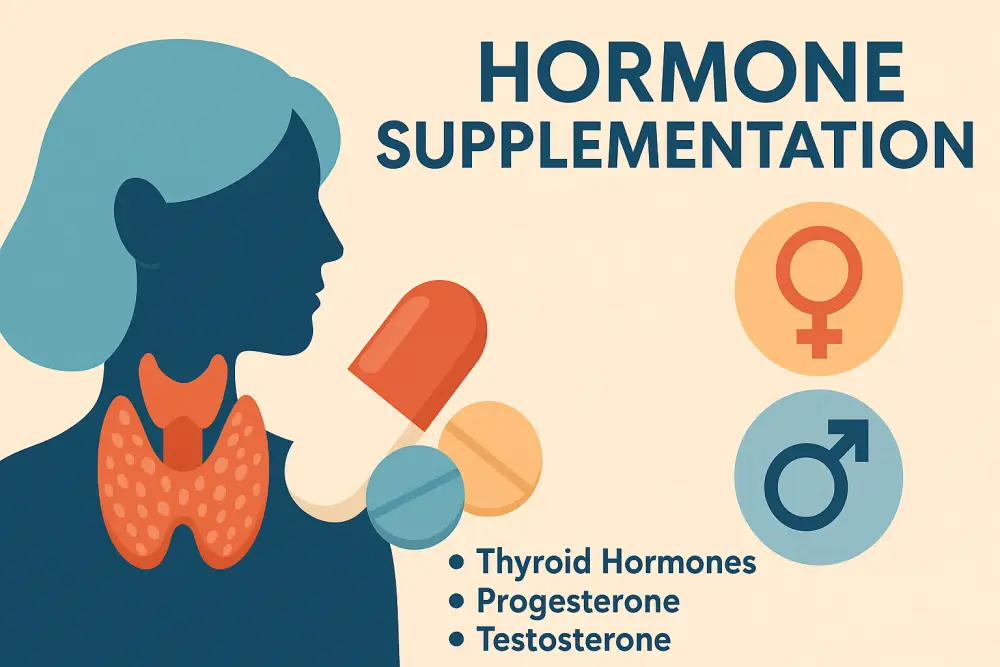The thyroid is a walnut-sized gland located at the base of the neck. Its butterfly shape, made of two lobes connected across the midline, plays a vital role in the body’s metabolism. When the thyroid enlarges, a goiter can develop. Historically, this condition was often linked to iodine deficiency before the use of iodized salt became common.
As a master gland, the thyroid affects nearly every system in the body. Deficiency or excess of thyroid hormones can cause wide-ranging problems. The most common issue is hypothyroidism, where hormone production slows gradually. Hormone supplementation, especially thyroid hormone replacement, has been shown to restore energy, improve focus, and dramatically improve quality of life for many patients.
Hormone Supplementation and Menopause
During menopause, thyroid hormone activity often declines further. Women may experience vague but persistent symptoms such as:
- Fatigue and low energy
- Depression, irritability, or mood swings
- Cold intolerance
- Dry, thinning hair and skin
- Difficulty concentrating
- Fluid retention and bloating
- Joint stiffness and pain
- Constipation
- Elevated cholesterol
Unfortunately, many doctors attribute these signs to “normal aging” rather than subtle hormone imbalance. Yet research and clinical experience show that targeted thyroid hormone supplementation can help women regain vitality and balance during midlife transitions.
Understanding Thyroid Blood Tests
The standard test for thyroid function is TSH (Thyroid Stimulating Hormone). Produced by the pituitary gland, TSH signals the thyroid to make more hormone. A high TSH indicates hypothyroidism, while a very low TSH may indicate hyperthyroidism. However, the “normal range” of TSH is not always reliable, leaving many patients untreated despite clear symptoms.
For example, a woman with TSH results that double over time—yet remain in the so-called normal range—may still struggle with fatigue, poor memory, and other hypothyroid symptoms. In such cases, hormone supplementation should be considered as a safe and effective treatment option.
Why Hormone Supplementation Works
At centers like the Saginaw Menopause Center, many women report life-changing improvements after beginning thyroid hormone supplementation. Benefits include:
- Improved energy and mental clarity
- Better mood stability
- Relief from joint and muscle pain
- Lower cholesterol levels
- Enhanced overall quality of life
Monitoring is essential. Too much thyroid hormone can cause heart rhythm problems or bone loss, but when properly managed, supplementation is generally safe and highly effective.
Beyond Thyroid: Other Hormone Supplementation Options
Comprehensive hormone therapy may involve more than thyroid hormones. Depending on the patient’s needs, physicians may recommend:
- T4 and T3 supplementation – Synthetic or natural extracts tailored to restore balance
- Progesterone supplementation – Often neglected, but critical for managing menopausal symptoms
- Testosterone supplementation – Supports libido, muscle mass, and mental sharpness
Each form of hormone supplementation must be individualized to a woman’s unique health profile, ensuring safe and effective results.
Final Thoughts on Hormone Supplementation
If you struggle with persistent symptoms such as fatigue, mood changes, or cognitive decline despite “normal” lab tests, it may be time to explore hormone supplementation. With proper evaluation, treatment can restore balance, energy, and quality of life.
For those interested in deeper knowledge, resources like The Thyroid Solution by Dr. Ridha Arem provide expert guidance on thyroid and hormone therapy.
Hormone Supplementation: Frequently Asked Questions
What is hormone supplementation and who might benefit?
Hormone supplementation is the targeted replacement of hormones—most commonly thyroid hormones (T4/T3), progesterone, or testosterone—to correct clinically significant deficiencies or imbalances. Adults with persistent symptoms such as fatigue, cold intolerance, dry skin, cognitive fog, or low libido—especially during peri- or post-menopause—may benefit after medical evaluation.
Can I have hypothyroid symptoms even if my TSH is “normal”?
Yes. “Normal” ranges are population averages and can miss low-grade deficiency. Trends over time (e.g., a rising TSH within the reference range) plus symptoms and free T4/T3 levels can justify a supervised trial of thyroid supplementation.
Which thyroid hormone is best—T4, T3, or a combination?
Most patients start with levothyroxine (T4). Some with persistent symptoms may benefit from combination therapy (T4+T3) or carefully dosed liothyronine (T3). The choice should be individualized, guided by symptoms, labs, and clinician judgment.
How long does it take to feel better after starting thyroid supplementation?
Energy and cognitive benefits may appear within 2–6 weeks, with full stabilization taking 6–12 weeks after dose adjustments as TSH and free hormone levels equilibrate.
What are the risks of too much thyroid hormone?
Excess dosing can cause palpitations, anxiety, insomnia, and long-term bone loss or arrhythmias. Regular monitoring (TSH, free T4 ± free T3) and clinical review minimize these risks.
Is progesterone supplementation useful in menopause?
Yes. Micronized progesterone can improve sleep, reduce vasomotor symptoms in some patients, and balance estrogen therapy when indicated. It’s generally well tolerated when properly prescribed.
What about testosterone for women?
Low-dose, clinically supervised testosterone may improve libido and energy in select women. Monitoring is essential to avoid acne, hair changes, or lipid alterations.
Do I still need iodine if I’m on thyroid supplementation?
Most people in iodized-salt regions meet iodine needs through diet. Supplementing extra iodine is usually unnecessary and can be harmful at high doses—discuss with your clinician first.
How often should labs be checked?
Typically 6–8 weeks after initiating or changing dose, then every 6–12 months when stable, or sooner if symptoms change.
Who should avoid hormone supplementation?
People with untreated adrenal disorders, uncontrolled cardiovascular disease, active arrhythmias, or hormone-sensitive cancers require specialized evaluation before therapy. Always consult your healthcare professional.
Medical disclaimer: This content is educational and not a substitute for professional medical advice. Always consult your clinician for personalized guidance.

